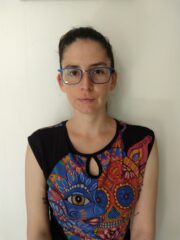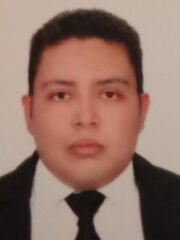Daniel Vermont
I have a Bachelors degree in psychology and am currently studying a Masters degree in Individual and
Maribel Cadena
I am a psychologist with 5 years of experience. I have knowledge in intervention strategies in psych
Anaissa Ramon
My psychotherapeutic practice is based on the Integrative Theory, which consists of using various ps
Sofía Álvarez (MPH, BA Psychology)
I'm a psychologist with a Master's degree in Public Health with specialization in Biostatistics and
Martha Rut Avendaño
I studied a master's degree in family therapy and I have experience working with adults, teens and k
Eduardo Amaranto Jiménez Padilla
Cognitive behavioral therapist specialized in the treatment of anxiety disorders, depression, grief
Ana Paula Gómez
Experienced psychotherapist in the field of health psychology and drown towards the work with people
Online therapy in Mexico City
In Mexico City, the amount of people experiencing depression, anxiety and other mental problems is very high. In fact 1/4sth of all Mexicans have been diagnosed with a psychiatric disorder. An American study showed that one in six had a psychiatric diagnosis. This study was done in several American cities, with the highest rates of mental health diagnosis occurring in Atlanta. Mexico City is twice as populated as Atlanta, but the rate of mental health issues are more common that one would imagine. A big problem in Mexico and the rest of Latin America is that there isn’t enough professionals to help all those who need it. This is where the tremendous potential of internet comes in to help those who need it most. Mexico has online therapy that uses the internet to help patients overcome mental health challenges.
Online therapy in Mexico City can be taken advantage of by anyone who is interested in it. Sometimes people are embarrassed to see a professional and prefer the anonymity of an online therapist, especially when there is no known treatment for their condition.
![]() There is no greater agony than bearing an untold story inside you.
There is no greater agony than bearing an untold story inside you. ![]()
Begin Therapy
Chat or Video Consult online with therapist
Mental Health in Mexico City
The 2016 World Health Organization (WHO) Mental Health Atlas reports 5.2 million people in Mexico City alone live with a mental health condition. These individuals are living with depression, anxiety, schizophrenia, bipolar disorder, and other disorders that the WHO classifies as “serious”.
It is reported that 3 out of 4 Mexican adults live with some form of mental illness, which affects their day-to-day life. The WHO Mental Health Atlas reports that while there are more women than men living with a mental health condition in Mexico, the gap between the number of males and females has narrowed considerably over the past decade thanks to increased awareness about mental health conditions among men. Unfortunately, though rates of suicide have decreased nationwide since 2007, suicide remains the leading cause of death for Mexican men between the ages of 15 and 29.

Mental health conditions are often stigmatized in Mexico, which can prevent individuals from seeking treatment. According to the 2016 World Health Organization Mental Health Atlas, mental health is still not considered an integral part of primary care, leaving most Mexicans without access to treatment that could improve their quality of life. This lack of accessible mental healthcare is often due to a lack of funding or available resources, especially in more rural areas with fewer people. Although it is increasingly recognized that mental illness has biological causes like genetics and brain chemistry exactly how these factors interact with each person’s lifestyle remains unknown.
The WHO Mental Health Atlas reports that 50% of those living with depression do not have access to treatment. The Atlas also states that depression is the leading cause of disability in Mexico City, affecting 1 in every 5 adults between the ages of 18 and 65. Depression can be treated with psychotherapy or medication, but according to the 2016 World Health Organization Mental Health Atlas, only 28% of Mexicans living with depression are receiving treatment for their condition.
Best Therapists in Mexico City
Sara Smith
She is a therapist and hypnotherapist. She works at the clinic Aura Psicosomatica in Mexico City, near Polanco. She practices psychoanalysis. She treats a lot of patients with depression and anxiety. She also specializes in addiction recovery.
Diego Garcia-Borreguero
He is a psychoanalyst and professor emeritus at the Universidad Autónoma de Madrid. He works at the clinic Médica Sur in Mexico City, near Coyoacán. He treats all kinds of psychological problems such as anxiety, depression, grief, trauma, etc., but he is especially good for treating schizophrenia and other psychotic disorders. He treats patients from all over Latin America.
Dr. Anita
She is a therapist, psychoanalyst and has her own clinic in Mexico City. I don’t remember the name of the place but it’s near Polanco and it’s called “Anita’s”. She specializes in treating depression and anxiety using psychoanalysis. She treats people from all around Latin American countries like Brazil, Cuba, and Argentina. (She speaks English and Portuguese).
Virginia Gonzalez
She is a clinical psychologist and psychoanalysis teacher at the Universidad Nacional Autónoma de México (UNAM) and she teaches cognitive-behavioral therapy (CBT) classes too. She works at the clinic UAM-C in Mexico City, near the UNAM. She treats different kinds of psychological problems but she specializes in treating depression and anxiety.
Paco Orihuela
He is a psychologist born in Barcelona who got his Ph.D. at UAB University. He works at the clinic Médica Sur, near Coyoacán. He treats all kinds of psychological problems but he mostly deals with people suffering from addiction (drugs, alcohol, sex). His philosophy is that therapy doesn’t need to belong to be effective.
Types of therapists in Mexico City
- – Relationship therapists in Mexico City
- – Marriage counselors in Mexico City
- – Divorce counselors in Mexico City
- – Family counselors in Mexico City
- – Child therapists in Mexico City
- – Teen therapists in Mexico City
- – Anxiety therapists in Mexico City
- – Depression therapists in Mexico City
- – Stress therapists in Mexico City
- – LGBTQ therapists in Mexico City
- – ADHD therapists in Mexico City
- – Addiction therapists in Mexico City
- – Sex therapists in Mexico City
- – Employee therapists in Mexico City
- – PTSD therapists in Mexico City
- – Bipolar therapists in Mexico City
- – Insomnia therapists in Mexico City
- – Panic Attacks therapists in Mexico City
- – OCD therapists in Mexico City
Common types of therapies in Mexico City
Cognitive Behavioral Therapy (CBT)
Most common therapy approach in Mexico City is where the therapist challenges your negative thoughts about you and the world. He tries to alter unwanted behaviors or treat disorders such as depression.
Dialectical Behavior Therapy (DBT)
Second most common therapy approach in Mexico City is which the therapists teach behavioral skills (mindfulness & emotion regulation) to help clients enhance motivation. DBT is often used for mental health issues including eating disorders, PTSD, personality disorder, self-harming notions.
Existential Therapy
3rd most common therapy treatment in Mexico City focuses on self-actualization in the face of people’s challenges. Existential therapy aids clients in confronting hard and distressing truths about life and death.
Other therapy approaches include:
ACT Therapy in Mexico City, Art Therapy in Mexico City, Behavioral Therapy in Mexico City, Contemplative Therapy in Mexico City, Play Therapy in Mexico City, EMDR Therapy in Mexico City, Emotionally Focused Therapy in Mexico City, Existential Therapy in Mexico City, Experiential Therapy in Mexico City, Gestalt Therapy in Mexico City, Hypnotherapy Therapy in Mexico City, Music Therapy Therapy in Mexico City, Narrative Therapy in Mexico City, Psychodynamic Therapy in Mexico City, Psychoanalytic Therapy in Mexico City, and Somatic Therapy in Mexico City.
FAQ's
Psychologists or therapists in Mexico City help people understand and handle different life problems and mental health issues.
They diagnose and treat mental disorders, learning disabilities, and behavioral problems.
You should expect to pay between $100 and $250 for a face-to-face therapy session with a Mexico City area therapist. Online therapy in Mexico City is relatively affordable and therapists charge between $30 to $ 150. You can book both online and face-to-face sessions with a therapist in Mexico City via MantraCare.
In case you are looking for free therapists or free therapy, you can choose to call the Mexico City free helpline number. There are a few online therapy options that can be free or low-cost. At MantraCare, therapy can cost you as low as $10.
Anyone interested in working as a therapist or counselor in the Mexico City area must earn at least an accredited master’s degree in counseling or social work. Mexico City also has some continuing education requirements, and every counselor or therapist is required to know all the rules and laws that pertain to their profession.
Listing on MantraCare is Free for therapists from Mexico City or any part of the world. Therapists or Psychologists just need to submit their details with certificate via the Add listing button.







